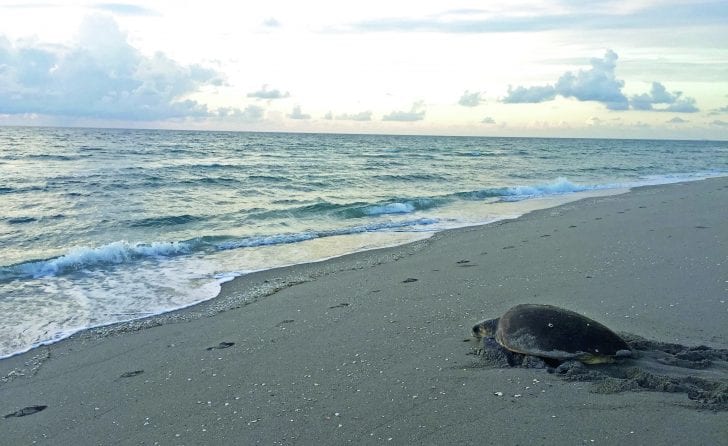9.5 miles of beach monitored by Loggerhead Marinelife Center supports nearly five percent of the world’s loggerhead sea turtle nests
Palm Beach County is home to some of the world’s most beautiful beaches attracting international visitors – some with feet, and thousands with flippers! Sea turtle nesting season officially began Friday, March 1 in Palm Beach County, so it is time to pay special attention to our beautiful beaches – home to some of the world’s most critical sea turtle nesting habitat.
Loggerhead Marinelife Center (LMC) researchers monitor a 9.5-mile stretch of beach from the northern Palm Beach County line (Jupiter Island) south to the northern border of John D. MacArthur Beach State Park. In 2018, the Center documented over 11,900 nests on that stretch. That’s about one nest every four feet and comprises approximately five percent of the world’s total loggerhead sea turtle nests.
“We are fortunate to study on one of the world’s most important sea turtle nesting beaches,” said Dr. Justin Perrault, LMC’s director of research. “In addition to day-to-day monitoring, this year, we are working on several research projects, collecting various samples to better understand local sea turtle populations and the impact humans have on them. We’re hopeful we can continue to use our findings to better protect sea turtles, and ultimately, our marine ecosystems.”
Nesting season runs through Oct. 31 in Palm Beach County. It is critical to protect our beaches every day – not just during nesting season.
“Sea turtles tell us the health of our ocean; the ocean tells us the health of our planet, we invite our community to join in our efforts to keep our local sea turtle nesting beaches cleaner and darker during nesting season,” said Jack E. Lighton, LMC’s President and CEO. “Cleaner and darker beaches help to protect nesting female sea turtles and increase the odds of survival for sea turtle hatchings.”
Just a few simple steps can help ensure the safety of nesting females and hatchlings during the season:
Do:
• Throw away debris left behind on the beach
• Fill in holes in the sand, knock down sand castles and remove foreign
objects that may obstruct a sea turtle’s path to and from the ocean
• If you come across a nesting sea turtle, observe at a distance from behind
• Look out for disoriented hatchlings on trails and roads near the beach
• Keep your lights out near the beach and install sea turtle-friendly lighting
where needed
Bring weak or disoriented hatchlings to Loggerhead Marinelife Center. They can be placed in the 24-hour drop-off cooler located outside the Center’s entrance (14200 US Highway One, Juno Beach, FL 33408)
Don’t:
• Interact with or disrupt a nesting sea turtle – it is illegal
• Release balloons (deflated ones resemble jellyfish, a common prey item for sea turtles)
• Use lighting on the beach at night including flashlights, lanterns, flash photography
and cell phones
• Touch hatchlings on their way to the ocean
• Take or touch empty egg shells, or exposed, un-hatched eggs
• Harm or harass sea turtles, their nests or hatchlings
• Use shovels to dig on the beach during nesting season
It is illegal to harm or harass sea turtles, their nests or hatchlings, which are protected by the U.S. Endangered Species Act of 1973 and Florida Statute Chapter 370. For more information about sea turtle nesting, please visit www.marinelife.org/nesting or www.marinelife.org/research.
Loggerhead Marinelife Center is a nonprofit sea turtle research, rehabilitation and educational institution that promotes conservation of ocean ecosystems with a focus on threatened and endangered sea turtles. The Center features an on-site hospital, research laboratory, educational exhibits and aquariums, and also operates the Juno Beach Pier, which hosts world-class angling and sightseeing. Situated on one of the world’s most important sea turtle nesting beaches, Loggerhead Marinelife Center is open daily and hosts over 350,000 guests free-of-charge each year. The Center’s conservation team works with 76 local and international organizations across six continents to form partnerships and share conservation initiatives and best practices that are core to its mission of ocean conservation. The Center is expanding and has launched its Waves of Progress capital expansion campaign, designed to accelerate and amplify LMC’s conservation and education impact. When complete, the facility will offer one of the world’s most advanced and unique experiences for guests and scientific partners. For more information, visit marinelife.org or call (561) 627-8280.
